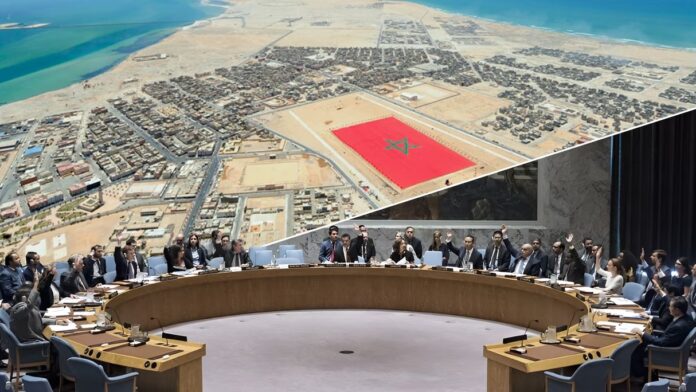The United Nations has taken a decisive stand in a decades-long territorial dispute by adopting a historic resolution that firmly endorses Morocco’s autonomy plan as the only credible and realistic foundation for negotiations on the future of the Moroccan Sahara.
Following intense diplomatic efforts, the UN Security Council approved a streamlined, two-page resolution that breaks with the vague, repetitive language of previous texts. This new document offers a clear and direct vision: a broad autonomy for the Moroccan Sahara under the full sovereignty of the Kingdom of Morocco.
The resolution was adopted with 11 votes in favor and no opposition. Three countries (China, Russia, and Pakistan) abstained. Algeria, despite being a current non-permanent member of the Security Council, did not participate in the vote. The Council is made up of fifteen members, including five permanent ones (the United States, France, the United Kingdom, Russia, and China) and ten elected for two-year terms, among them Switzerland, Japan, the Republic of Korea, and Algeria.
In the final hours before the vote, a few adjustments were made-most notably the inclusion of the term “self-determination,” reportedly at Russia’s request. However, the word “referendum” was completely removed. The underlying message leaves no room for ambiguity: negotiations must resume immediately, and Morocco’s proposal is the only plan recognized as viable.
The Security Council explicitly commends Rabat’s initiative, describing it as serious, credible, and realistic. It urges the rapid reconvening of roundtable discussions involving Morocco, Algeria, the Polisario Front, and Mauritania, with the goal of reaching a definitive political solution by October 2026, within the framework of Morocco’s territorial sovereignty.
The resolution also extends the mandate of the UN peacekeeping mission, MINURSO, for another year. UN Secretary-General António Guterres is tasked with presenting a report on developments within six months. The preamble reaffirms the Council’s support for Guterres and his Personal Envoy, Staffan de Mistura, in their ongoing efforts to mediate the conflict.
By officially recognizing Morocco’s autonomy plan as the only path forward, the UN has delivered a major diplomatic victory to the Kingdom. Since 2007, Morocco has defended this approach as the only practical and lasting solution to a dispute that has persisted for nearly fifty years.
Across Morocco, the resolution was celebrated as a sweeping success-one that confirms not just Morocco’s rights, but the strength and consistency of its diplomacy. On the ground, in international capitals, and within the UN itself, Rabat’s foreign policy has proven its effectiveness in rallying support for a peaceful and lasting resolution, grounded in respect for Morocco’s national unity.
The Moroccan Sahara is, and will remain, an integral part of the Kingdom. This resolution reaffirms that reality with force and clarity, backed by overwhelming support from members of the UN Security Council.





